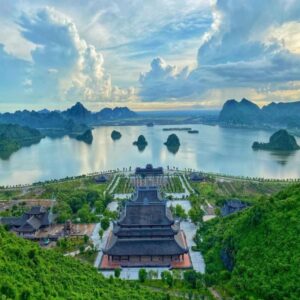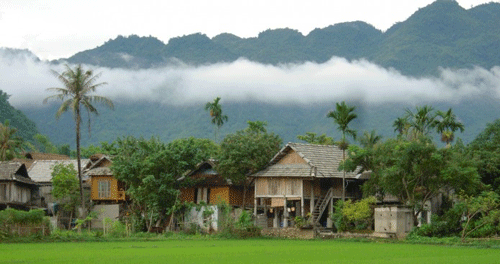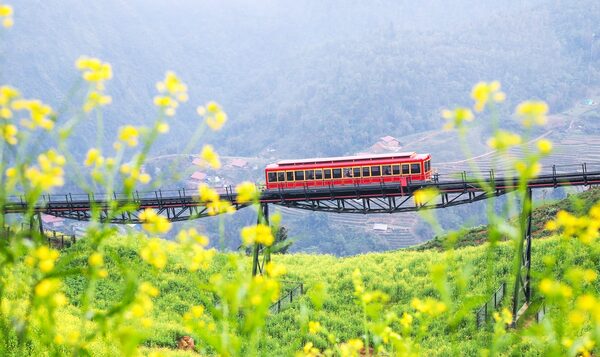On the theme of Vietnam’s spiritual travel, in our country’s culture, spirituality occupies a prominent place, playing a crucial role on a psychological level. Individuals often turn to spiritual places in Vietnam to pray and seek blessings such as wealth, fame, and health.
Spiritual travel, considered an essential form of cultural tourism in Vietnam, relies on the spiritual dimension both as a foundation and an objective, thus meeting the spiritual needs of individuals in their daily lives. This form of tourism also offers localities an opportunity to exploit their cultural and religious resources, catering to the desires of visitors to discover and worship sacred sites from various regions. Well-established in the world of travel, spiritual tourism holds particular importance in terms of beliefs, religion, as well as relaxation and spiritual well-being.
Each spiritual places in Vietnam has its own significance, giving visitors the chance to deepen their understanding of history, architecture, and sacred ancestral values. Vietnam, with its rich history, vibrant culture, and spiritual traditions, offers a multitude of captivating destinations for those seeking inner peace and spiritual enrichment. From ancient temples to peaceful natural landscapes, each place is a window into the soul of Vietnam and its profound beliefs.
Here are the 6 most famous spiritual places in Vietnam, promising an unforgettable experience to their visitors:
1. Perfume Pagoda
The Perfume Pagoda (Vietnamese name: chùa Hương), located about 60 kilometers southwest of Hanoi, is a flagship destination for spiritual travel in Vietnam, offering much more than immersion in Buddhist spirituality – it represents a true journey into Vietnamese history and culture. Its enchanting natural setting, characterized by a landscape of limestone mountains and lush vegetation, is accessible after a boat ride along the Yen River, offering a deep spiritual experience isolated from the outside world.
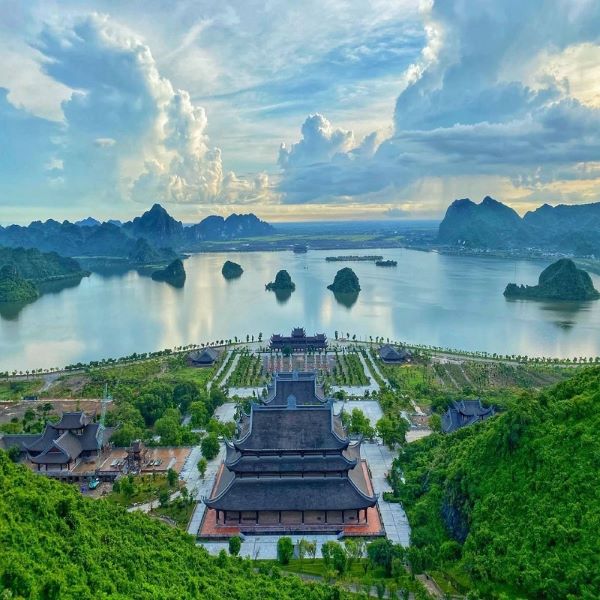
Perfume Pagoda
The site, a complex of centuries-old Buddhist temples and sanctuaries, has long served as a pilgrimage center. Devotees and monks regularly climb to reach the Huong Tich cave, a conducive place for prayer and meditation. The architecture of the complex, blending natural elements and human constructions, reflects Buddhist philosophy and is adorned with sculptures and frescoes depicting mythological and spiritual stories.
Visiting the Perfume Pagoda is a deep cultural and spiritual experience, where visitors can participate in traditional rituals, listen to Buddhist chants, and observe the monks’ way of life. This visit is not just a tourist activity but an opportunity to connect with the serenity of nature and the depth of Vietnamese spirituality, offering a more intimate understanding of Vietnam’s culture and beliefs.
2. Bai Dinh Pagoda, Ninh Binh
Bai Dinh Pagoda, located in Ninh Binh province, Vietnam, is a remarkable Buddhist complex that combines tradition and modernity. Known to be the largest pagoda in the country, it impresses with its Buddha statues, stupas, and temples, offering a harmonious blend of old and new. The site is a spiritual pilgrimage center, characterized by a majestic avenue lined with statues of Arhats leading to the pagoda, prompting introspection.
The new pagoda, a shining example of modern architecture, houses records such as the largest bronze Buddha statue in Southeast Asia and the largest bronze gong in Vietnam. These elements are not just attractions but symbolize the greatness of Buddhist faith. The surrounding gardens and lakes add to the serenity of the place, conducive to meditation.
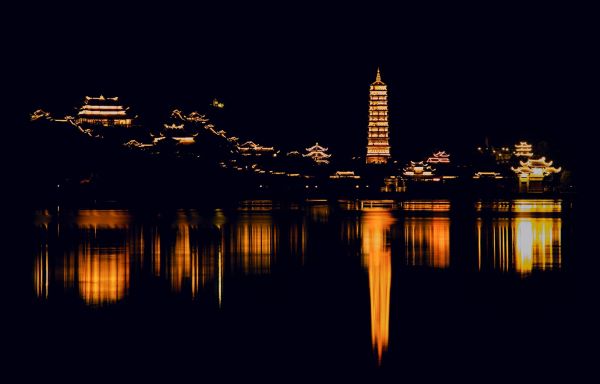
Bai Dinh Pagoda at night
Bai Dinh is also a cultural center, with temples richly decorated with sculptures and paintings reflecting Vietnamese Buddhism and its cultural influence. This spiritual journey to Bai Dinh Pagoda offers a unique immersion in tranquility and spirituality, inviting contemplation and connection with the Vietnamese spiritual heritage, for spiritual seekers, history enthusiasts, or curious travelers.
3. Con Dao
Con Dao (Vietnamese name: Côn Đảo), an archipelago off the southern coast of Vietnam, offers a unique experience of spiritual travel. Known for its historical past as a place of detention, Con Dao is now a spiritual pilgrimage site where visitors pay homage to the souls who suffered there. The island combines this rich history with exceptional natural beauty, offering pristine beaches, crystal-clear waters, and rich wildlife, ideal for contemplation and meditation.
Memorial sites such as Phu Hai prison and Hang Duong cemetery invite reflection on themes such as freedom and human resilience. The temples and sanctuaries of the island, such as Me Con Dao temple, reinforce this spiritual experience, allowing visitors to seek inner peace. Con Dao thus represents a memorable destination for spiritual travel in Vietnam, combining poignant history with natural serenity.
4. Yen Tu Mountain, Quang Ninh
Yen Tu Mountain, located in Quang Ninh province, Vietnam, near Halong Bay, is a key destination for spiritual journeys, renowned as the “cradle of Vietnamese Buddhism.” This sacred mountain, where King Tran Nhan Tong founded the Truc Lam Buddhist school in the 13th century, is adorned with hundreds of temples, sanctuaries, and chapels. It attracts thousands of pilgrims, particularly during the Tet festival.
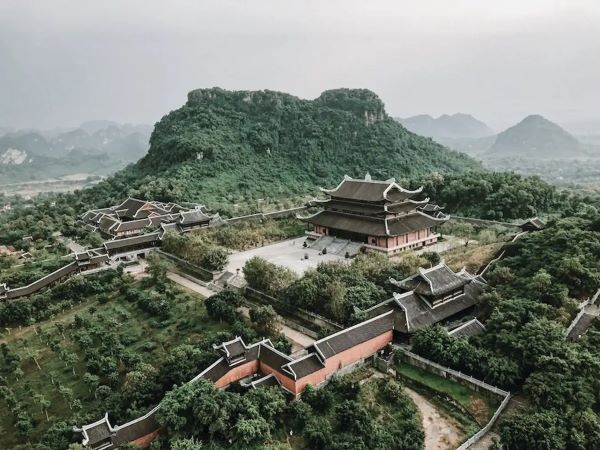
Yen Tu Mountain, Quang Ninh
Visitors can climb Yen Tu Mountain, a 6,000-meter journey symbolizing the quest for enlightenment, or use the cable car. At the summit, they find an ideal place for prayer, reflection, and contemplation of the landscape. The Yen Tu region also offers cultural and historical richness, reflecting the influence of Buddhism on Vietnamese culture, in a setting of natural beauty and serenity.
5. Hung Kings Temple, Phu Tho
The Hung Kings Temple, located about 80 km from downtown Hanoi in Phu Tho province, is a site of great cultural and spiritual importance in Vietnam. Dedicated to the Hung Kings, considered the mythical founders of the country, this complex includes four main temples – Ha, Trung, Thuong, and Gieng – as well as a mausoleum and a monastery.
Nestled on Nghia Linh Mountain, the temple is a key pilgrimage site, especially during the annual Hung Kings festival (Vietnamese name: Giỗ Tổ Hùng Vương), which takes place on the 10th day of the 3rd lunar month. This festival attracts millions of Vietnamese and is celebrated with traditional rituals, offerings, and cultural performances, highlighting national unity and the legacy of the Hung Kings.
The temple’s architecture, emblematic of the Vietnamese style, and its peaceful environment offer a profound immersion in the spirit and soul of Vietnam. Hung Kings Temple is a popular destination throughout the year, attracting visitors for tours and walks, and is a must-visit for those seeking to connect with Vietnamese spirituality, history, and culture.
6. Thien Mu Pagoda, Hue
Thien Mu Pagoda, located in Hue on the banks of the Perfume River, is an iconic spiritual site in Vietnam. Founded in 1601, it has become a symbol of the city and an important center of Buddhism. The pagoda is famous for its seven-story octagonal tower, Phuoc Duyen, offering a spectacular view of the surroundings, as well as for its temple, serene gardens, and large lucky bell. A place of meditation and peace, visitors can observe monastic practices and rejuvenate in a tranquil setting.
Thien Mu Pagoda is also a site of historical significance, having been a center of Buddhist protest in the 1960s. A spiritual journey to Thien Mu Pagoda offers a rewarding experience that combines architectural elegance, spiritual serenity, and historical relevance, capturing the cultural and spiritual essence of Vietnam.
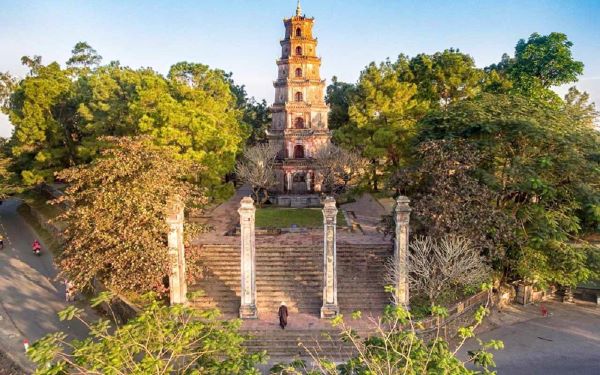
Thien Mu Pagoda – must-visit place on a spiritual trip to Vietnam
With its rich spiritual diversity, Vietnam offers unique spiritual places for contemplation and self-discovery. Whether you are fascinated by ancient history, architectural beauty, or spiritual practices, these places promise a rewarding journey into Vietnamese spirituality. With the assistance of Paradise Travel, access to these sacred sites becomes more accessible, ensuring a memorable and profound spiritual travel experience.
Read more:

